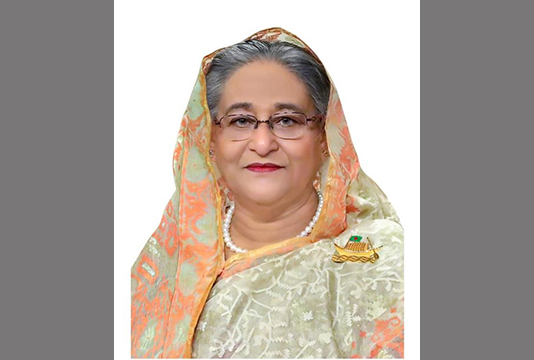DHAKA, May 6, 2021 (BSS) – The masterminds of the 2007-2008 pseudo-military rule visibly wanted to depoliticize Bangladesh, exiling politicians from the political front, installing an army-backed caretaker government in an extraordinary situation.
Contemporary history suggests the men behind the wheel of power wanted incumbent Prime Minister and ruling Awami League President Sheikh Hasina to keep away from the country, exhausting every option which they could use, including intimidation as part of a design.
Sheikh Hasina was on her way back home en route to London, after receiving treatments in the United States, when desperate efforts were initiated to prevent her from returning to Bangladesh exploiting the foreign diplomatic and internal political means, as well.
Pressures were mounted on British Airways to scrap her ticket to Dhaka which initially succumbed to that force but later reversed their stance as counter warning was issued that the reputed airlines could be exposed to litigation if it defied to carry her.
Sheikh Hasina appeared adamant in her decision to back home and eventually she returned acknowledging the risks of her subsequent imprisonment.
Eminent civil society figure and former Dhaka University Vice-Chancellor Professor AAMS Arefin Siddique said those who formed the government during that period visibly wanted to push the country’s democracy in exile, eliminating the country’s democratic forces.
Siddique, who is currently the chairman of board of directors of Bangladesh Sangbad Sangstha (BSS), said the then government knew who could wage protest and movements to retrieve democracy in the country keeping in mind Sheikh Hasina’s role in 1980s.
Leading civil society figure and Liberation War Museum Trustee Dr Mofidul Haque said: “This was the reflection of Sheikh Hasina’s leadership quality and strength . . . her decision actually set the future course of Bangladesh political history on its right track.”
Haque said there were instances like Benigno Aquino Jr of the Philippines who was assassinated on airport tarmac on his return home and Sheikh Hasina knew it well to what circumstances she was returning.
Benigno Aquino Jr was a former Philippine senator and a longtime political opponent of the then President Ferdinand Marcos.
Earlier on April 9, 2007, it was announced that Bangladesh police were investigating extortion charges against Sheikh Hasina.
According to media reports and other records on April 18 in 2007, the military-backed interim government barred Sheikh Hasina’s return from the United States, a day after her the then arch-political rival Begum Khaleda Zia agreed to go abroad in exile.
Prof Siddique said the then government actually feared they might lose their grip if Sheikh Hasina returns to country and they might not control the situation.
So, in a planned way, they wanted to bar Sheikh Hasina’s return which she came to know after coming to the airport in London.
“It was a severe harassment . . . She was returning to her own country. If she committed any misdeed, she could be tried in her own country,” said Siddique, who was prominent civil society figure being a respected university professor and professional leader.
He recalled that in the morning on the day when Sheikh Hasina was blocked from boarding a flight home from London, he was doing his routine work at the university when an army brigadier of DGFI phoned him and asked in strong words to keep silence on the then prevailing situation.
The noted academic said the brigadier also advised him not to wage any protest without pointing out anything about the bar on Sheikh Hasina’s return.
“At that moment, I didn’t know that Sheikh Hasina was prevented from returning home. After the phone call, I came to know from international media reports that she was barred from returning home,” he recalled.
Sheikh Hasina initially planned to return on April 23 but on April 18, the government issued an order obstructing her homecoming, saying, “She had made provocative statements and that her return could cause disorder.”
A warrant was issued by a Bangladeshi court for her arrest on April 22, the day Sheikh Hasina attempted to get onboard an aircraft in London but was not allowed on the flight.
Describing the case against her as totally false and fake, Sheikh Hasina said that she wanted to defend herself against the charges in court.
On April 23, the arrest warrant was suspended and on April 25 the ban on Sheikh Hasina’s entry into the country was dropped.
After spending 51 days in the USA and UK, on May 7, 2007 Sheikh Hasina arrived at the airport in Dhaka, where she was greeted by a jubilant crowd of several thousand.
At the airport Sheikh Hasina told reporters that it was a mistake for the government to stop her from returning and expressed her hope it would not “make a bigger mistake” acknowledging the reversal of the government order as a positive gesture.
Yet, on July 16, 2007 Sheikh Hasina was arrested by police from her home and taken before a local court in Dhaka where she was accused of “extortion” and was denied bail.
The arrest was widely seen as move by the military-backed interim government to force Sheikh Hasina to leave Bangladesh into political exile as earlier attempts were made to prevent her from coming back.
After a lengthy legal process on June 11, 2008 Sheikh Hasina was released on parole for treatment.
She decided to participate in the parliamentary election under the name of “Grand Alliance” and on December 12, 2008, she formally announced her party’s election manifesto and vowed to build a “Digital Bangladesh” by 2021.
Her Bangladesh Awami League and its Grand Alliance secured a landslide victory in the 2008 general election with a two-thirds majority.



